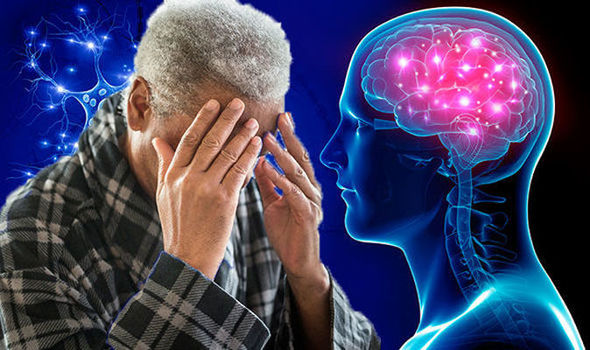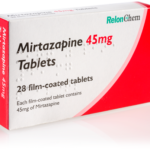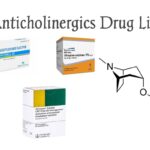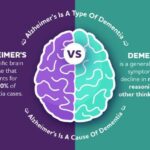List Of Drugs That Can Cause Dementia

Dementia is a general term used to describe a group of conditions characterized by impairment of at least two brain functions, such as memory loss and judgement. Symptoms include forgetfulness, limited social skills and thinking abilities so impaired that it interferes with daily functioning.
Worldwide, around 55 million people have dementia, with over 60% living in low- and middle-income countries. As the proportion of older people in the population is increasing in nearly every country, this number is expected to rise to 78 million in 2030 and 139 million in 2050. Alzheimer’s is the most common cause of dementia.
Drugs and Dimentia
A new study has shown that anticholinergic drugs were associated with a higher risk of dementia. More specifically, however, anticholinergic antidepressants, antipsychotic drugs, anti-Parkinson’s drugs, bladder drugs, and epilepsy drugs were associated with the highest increase in risk.
Many medications have at least some anticholinergic effects, and it’s estimated that up to half of older adults in the US take one or more of these medications. Common examples include:
- amitriptyline, paroxetine, and bupropion (most commonly taken for depression)
- oxybutynin and tolterodine (taken for an overactive bladder)
- diphenhydramine (a common antihistamine, as found in Benadryl).
In the new study, researchers collected detailed information from more than 300,000 adults ages 65 and older, and compared medication use among those diagnosed with dementia with those who were not. Those who had taken any medication with anticholinergic activity were 11% more likely to be eventually diagnosed with dementia; for those drugs with the most anticholinergic effects, the risk of dementia was 30% greater. The largest impact was found for drugs commonly taken for depression, bladder problems, and Parkinson’s disease; for antihistamines, and some other anticholinergic drugs, no increased risk of dementia was observed.
In addition, a team of researchers from France and Canada linked benzodiazepine use to an increased risk of being diagnosed with Alzheimer’s disease. In the study, the greater people’s cumulative dose of benzodiazepines, the higher their risk.
The researchers relied on a database maintained by the Quebec health insurance program. From it, they identified nearly 2,000 men and women over age 66 who had been diagnosed with Alzheimer’s disease. They randomly selected more than 7,000 others without Alzheimer’s who were matched for age and sex to those with the disease. Once the groups were set, the researchers looked at the drug prescriptions during the five to six years preceding the Alzheimer’s diagnosis.
People who had taken a benzodiazepine for three consecutive months or less had about the same dementia risk as those who had never taken one. But those who had taken a benzodiazepine for three to six months had a 32% greater risk of developing Alzheimer’s, and those taking one for more than six months had an 84% greater risk than those who hadn’t taken one.
In general, studies indicate that antidepressants, bladder antimuscarinics, antipsychotics and antiepileptic drugs resulted in nearly “50% increased odds of dementia,” according to the observational study published Min the peer-reviewed JAMA Internal Medicine journal.
Full List Of Drugs Linked To Dementia
Here is a full list of the classes of medication linked to dementia and drug examples in each category:
Antidepressants
Examples Of Antidepressants – Tricyclic Antidepressants (TCA)
- amitriptyline (Elavil)
- amoxapine
- clomipramine (Anafranil)
- desipramine (Norpramin)
- doxepin (Sinequan)
- imipramine (Tofranil)
- maprotiline
- nortriptyline (Pamelor)
- protriptyline (Vivactil)
- trimipramine (Surmontil)
Selective Serotonin Reuptake Inhibitors
- Citalopram (Celexa)
- Escitalopram (Lexapro)
- Fluoxetine (Prozac, Sarafem)
- Fluvoxamine (Luvox)
- Paroxetine (Paxil)
- Sertraline (Zoloft)
Serotonin Norepinephrine Reuptake Inhibitors
- duloxetine (Cymbalta)
- venlafaxine (Effexor)
- desvenlafaxine (Pristiq)
Monoamine oxidase inhibitors
- phenelzine (Nardil)
- tranylcypromine (Parnate)
- isocarboxazid (Marplan)
- selegiline (EMSAM, Eldepryl)
Other Antidepressants
- Mirtazapine (Remeron)
- Desyrel (trazodone)
- Bupropion (Wellbutrin)
- nefazodone (Serzone)
Antiparkinson drugs
- amantadine
- Apokyn
- apomorphine
- bromocriptine
- Cycloset
- Gocovri
- Kynmobi
- Mirapex
- Mirapex ER
- Neupro
- Osmolex ER
- Parlodel
- pramipexole
- Requip
- Requip XL
- ropinirole
- rotigotine
Antipsychotics
- aripiprazole (Abilify)
- asenapine (Saphris)
- cariprazine (Vraylar)
- clozapine (Clozaril)
- lurasidone (Latuda)
- olanzapine (Zyprexa)
- quetiapine (Seroquel)
- risperidone (Risperdal)
- ziprasidone (Geodon)
Antimuscarinics
- Oxybutynin
- Tolterodine
- Propiverine
- Darifenacin
- Solifenacin
- Trospium
- Fesoterodine
Antiepileptic drugs
- Phenobarbital (many brand names)
- Lamotrigine (lamictal)
- Carbamazepine (tegretol)
- Topiramate (topamax)
- Oxcarbazepine (trileptal)
- Zonisamide (zonegran)
- Gabapentin (neurontin)
- Levetiracetam (keppra)
Antihistamines
- Brompheniramine (Dimetane)
- Cetirizine (Zyrtec)
- Chlorpheniramine (Chlor-Trimeton)
- Clemastine (Tavist)
- Diphenhydramine (Benadryl)
- Fexofenadine (Allegra)
- Loratadine (Alavert, Claritin)
Gastrointestinal antispasmodics
- atropine.
- belladonna.
- dicyclomine (Bentyl)
- hyoscyamine (Levsin) (This drug is no longer available in the US)
- loperamide (Imodium)
- promethazine (Phenergan)
Skeletal Muscle Relaxants
- Amrix
- arbaclofen
- baclofen
- carisoprodol
- chlorzoxazone
- cyclobenzaprine
- Dantrium
- dantrolene
- Diastat
- Diastat AcuDial
- diazepam
- Fexmid
- Flexeril
- Gablofen
- Lioresal
- Lorzone
- metaxalone
- methocarbamol
- Norflex
- Ontinua ER
- orphenadrine
- Ozobax
- Parafon Forte DSC
- Revonto
- Robaxin
- Ryanodex
- Skelaxin
- Soma
- Valium
Antimuscarinic bronchodilators
- Tiotropium (Spiriva)
- Umeclidinium (Incruse Ellipta)
- Aclidinium (Tudorza Pressair)
- Ipratropium (Atrovent)
- Revefenacin (Yupelri)
- Glycopyrrolate (Seebri Neohaler, Lonhala Magnair)
Antiarrhythmics
- Amiodarone (Cordarone, Pacerone)
- Flecainide (Tambocor)
- Ibutilide (Corvert)
- Lidocaine (Xylocaine)
- Procainamide (Procan, Procanbid)
- Propafenone (Rythmol)
- Quinidine (many brand names)
- Tocainide (Tonocarid)





